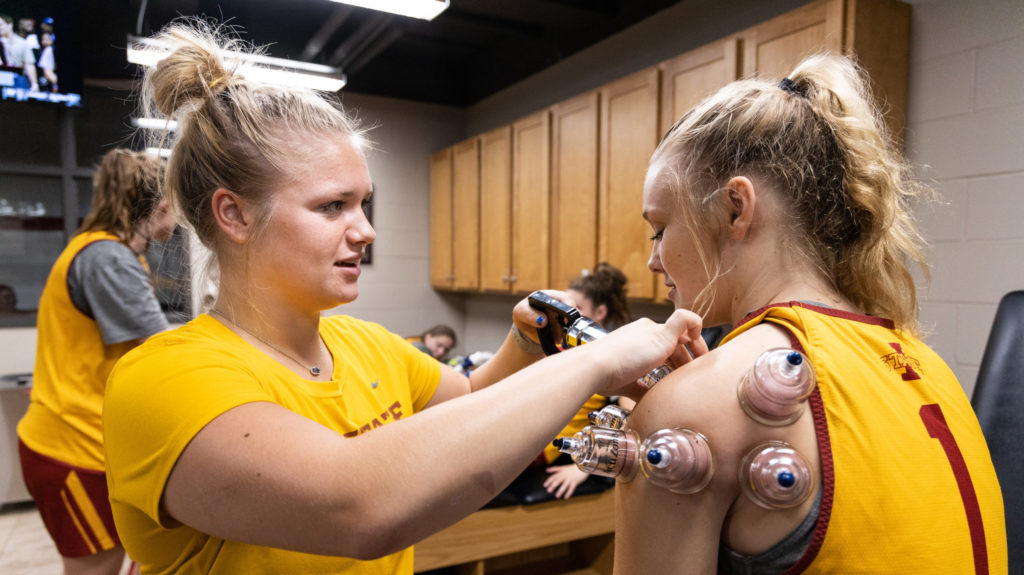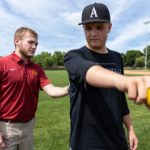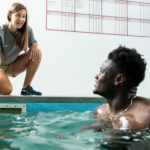Iowa State adapts athletic training program to meet new national standards
12/09/2019

Athletic training student applying cupping therapy on a womens basketball student athlete
Due to changing standards in the athletic training profession, Iowa State University has elevated its athletic training program from a bachelor’s degree to a master’s degree program — Master’s of Athletic Training (MATR).
Accredited by The Commission on Accreditation of Athletic Training Education (CAATE) since 2001, the program has reapplied for the same accreditation for the new master’s program. CAATE is the national accrediting organization that establishes professional standards and regulations for athletic training programs.
The pass rates for the Board of Certification (BOC) examination at Iowa State are all well above the national averages. In 2016-2019, 88% of students passed the BOC exam on their first try, compared to the national average of 81%; The graduation rate over the past two years has been 100%. The new master’s program will begin in the summer of 2020.
For students who already have a bachelor’s degree, classes can be taken for the program online or through a combination of online and traditional courses. The MATR will be a year-round, 24-month, 58-credit program. The program is also designed so high school graduates can earn both a bachelor’s and master’s degree in five years.
In this program, students will continue to be taught by certified athletic trainers who actively practice, bringing fresh perspectives to the classroom and rounding out academic focuses with experiential focuses. This prepares students for a combination of coursework and hands-on clinical practice.
Mary Meier, Iowa State athletic training program director, said the MATR program will bring students to a high level of expertise in athletic training through immersive, industry-focused coursework.
“The master’s program will allow [students] to have more specific, refined courses without worrying about [general education] classes,” Meier said.
Prospective graduate students are intrigued to see how this program will affect their educational and professional plans. Brad Roberts, a junior in pre-athletic training at Iowa State, found additional school to be beneficial, as he hopes to become an athletic trainer in professional sports.
“My goal is to be the best athletic trainer I can. Now that [Iowa State] switched to a master’s program, I don’t feel rushed to know every little thing about athletic training,” Roberts said. “I have five years to learn how to be a great athletic trainer rather than four. To me, the more experience I get, the better I’ll be as I start my career.”
Iowa State is one of the few institutions that provide undergraduate athletic training students hands-on clinical experience early in their academic career. An anchor of the program is the strong relationship between the Department of Kinesiology and ISU Athletics. This relationship provides a wealth of opportunities for clinical experiences with collegiate athletes, under the supervision of full-time clinical athletic trainers who have 20 or more years of clinical experience.
Iowa State athletic training students learn in well-equipped clinical and teaching facilities. The Department of Kinesiology has two full-time athletic training faculty dedicated solely to the academic portion of the program. Plans are underway to add a third faculty member, which will exceed CAATE resource requirements.
Besides the full-time faculty, four clinical athletic trainers in ISU Athletics, each with more than 20 years of clinical experience, have been identified as potential graduate lecturers for the MATR program. These certified athletic trainers serve athletic teams and provide clinical instruction for athletic training students. The clinical professionals also have certifications in a broad spectrum of specialty treatment techniques, from dry needling to suturing. Clinical instructors who also work at Ames High School, McFarland Clinic, and Mary Greeley Medical Center further broaden and strengthen the clinical experiences of Iowa State athletic training students.
Samantha Wolfe, a senior in athletic training at Iowa State, will not need to pursue her MATR to become an athletic trainer because she is graduating before the new standards go into effect.
“There are additional skills that they are including in the new masters that I think are going to set a lot of students graduating from Iowa State apart: new skills such as suturing, potentially EMT certification, etcetera,” Wolfe said. “Many organizations, including the Indianapolis Colts where I interned for two summers, credit the elite program at Iowa State as a main reason they keep inviting students back.”
Key contacts
Mary Meier, athletic training master’s degree program director, Kinesiology, mary@iastate.edu, 515-294-3587.
Cathy Curtis, communications director, College of Human Sciences, ccurtis@iastate.edu, 515-294-8175.
Jill Even, communications assistant, College of Human Sciences, hsannouncer@iastate.edu, 515-294-1326.

